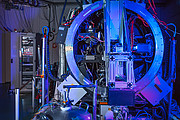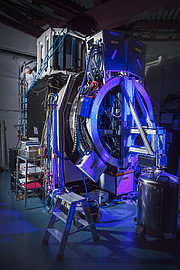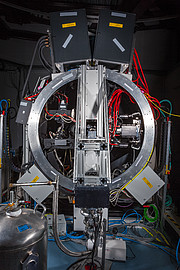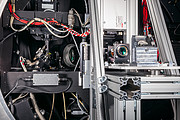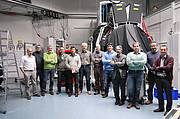Annuncio
Il sistema di ottica adattiva GALACSI è pronto per essere montato sul VLT
Lo strumento MUSE del VLT sarà presto in grado di osservare ancora più nitidamente
15 Aprile 2016
Il modulo per l'ottica adattiva GALACSI, costruito dagli ingegneri dell'ESO al quartier generale a Garching, è stato testato a fondo ed è stato promosso a pieni voti. Verrà spedito in Cile entro quest'anno per essere montato al VLT (Very Large Telescope) dell'ESO, a Cerro Paranal.
GALACSI è una parte del sistema di ottica adattiva che migliorerà significativamente le prestazioni dello strumento MUSE, uno spettrografo panoramico a campo integrale che opera nelle lunghezze d'onda della luce visibile. Lo strumento MUSE e il sistema GALACSI insieme saranno noti come MUSE facility. L'aggiunta di GALACSI a MUSE essenzialmente raddoppierà la quantità di energia in ogni pixel dell'immagine, fornendo agli astronomi uno strumento molto più potente. Oltre a determinare un enorme miglioramento delle capacità del VLT, GALACSI e gli altri elementi del sistema di ottica adattiva rappresentanto avanzamenti tecnologici che verranno sfrutttati anche per il futuro telescopio E-ELT (European Extremely Large Telescope).
I sistemi di ottica adattiva compensano gli effetti della turbolenza atmosferica, che degradano le immagini ottenute dai telescopi terrestri. Quando passa attraverso l'atmosfera, la luce proveniente da un oggetto celeste oscilla, e questo fa sì che il telescopio osservi un'immagine sfocata. GALACSI farà affidamento su 4 laser al sodio che verranno lanciati dal centro di uno degli Unit Telescopes del VLT per produrre "stelle artificiali", note come stelle guida. I sensori quindi seguono il moto di queste stelle guida mentre la loro luce oscilla nell'atmosfera turbolenta. Questo consente a un computer di calcolare la correzione da applicare allo specchio secondario deformabile del telescopio (anch'esso una nuova aggiunta al VLT) per compensare l'effetto della turbolenza atmosferica. In questo modo, si possono ottenere immagini estremamente nitide anche degli oggetti celesti osservati.
Links
- specifiche tecniche di GALACSI
- Evento per celebrare l'installazione del 4LGSF (4 Laser Guide Star Facility) al VLT
- Il VLT (Very Large Telescope)
- Lo spettrografo MUSE
Contatti
Robin Arsenault
ESO
Garching bei München, Germany
Tel: +49 89 3200 6524
Email: rarsenau@eso.org
Peter Grimley
ESO, Assistant Public Information Officer
Garching bei München, Germany
Tel: +49 89 3200 6383
Email: pgrimley@eso.org
Riguardo all'annuncio
| Identificazione: | ann16025 |
Our use of Cookies
We use cookies that are essential for accessing our websites and using our services. We also use cookies to analyse, measure and improve our websites’ performance, to enable content sharing via social media and to display media content hosted on third-party platforms.
ESO Cookies Policy
The European Organisation for Astronomical Research in the Southern Hemisphere (ESO) is the pre-eminent intergovernmental science and technology organisation in astronomy. It carries out an ambitious programme focused on the design, construction and operation of powerful ground-based observing facilities for astronomy.
This Cookies Policy is intended to provide clarity by outlining the cookies used on the ESO public websites, their functions, the options you have for controlling them, and the ways you can contact us for additional details.
What are cookies?
Cookies are small pieces of data stored on your device by websites you visit. They serve various purposes, such as remembering login credentials and preferences and enhance your browsing experience.
Categories of cookies we use
Essential cookies (always active): These cookies are strictly necessary for the proper functioning of our website. Without these cookies, the website cannot operate correctly, and certain services, such as logging in or accessing secure areas, may not be available; because they are essential for the website’s operation, they cannot be disabled.
Functional Cookies: These cookies enhance your browsing experience by enabling additional features and personalization, such as remembering your preferences and settings. While not strictly necessary for the website to function, they improve usability and convenience; these cookies are only placed if you provide your consent.
Analytics cookies: These cookies collect information about how visitors interact with our website, such as which pages are visited most often and how users navigate the site. This data helps us improve website performance, optimize content, and enhance the user experience; these cookies are only placed if you provide your consent. We use the following analytics cookies.
Matomo Cookies:
This website uses Matomo (formerly Piwik), an open source software which enables the statistical analysis of website visits. Matomo uses cookies (text files) which are saved on your computer and which allow us to analyze how you use our website. The website user information generated by the cookies will only be saved on the servers of our IT Department. We use this information to analyze www.eso.org visits and to prepare reports on website activities. These data will not be disclosed to third parties.
On behalf of ESO, Matomo will use this information for the purpose of evaluating your use of the website, compiling reports on website activity and providing other services relating to website activity and internet usage.
Matomo cookies settings:
Additional Third-party cookies on ESO websites: some of our pages display content from external providers, e.g. YouTube.
Such third-party services are outside of ESO control and may, at any time, change their terms of service, use of cookies, etc.
YouTube: Some videos on the ESO website are embedded from ESO’s official YouTube channel. We have enabled YouTube’s privacy-enhanced mode, meaning that no cookies are set unless the user actively clicks on the video to play it. Additionally, in this mode, YouTube does not store any personally identifiable cookie data for embedded video playbacks. For more details, please refer to YouTube’s embedding videos information page.
Cookies can also be classified based on the following elements.
Regarding the domain, there are:
- First-party cookies, set by the website you are currently visiting. They are stored by the same domain that you are browsing and are used to enhance your experience on that site;
- Third-party cookies, set by a domain other than the one you are currently visiting.
As for their duration, cookies can be:
- Browser-session cookies, which are deleted when the user closes the browser;
- Stored cookies, which stay on the user's device for a predetermined period of time.
How to manage cookies
Cookie settings: You can modify your cookie choices for the ESO webpages at any time by clicking on the link Cookie settings at the bottom of any page.
In your browser: If you wish to delete cookies or instruct your browser to delete or block cookies by default, please visit the help pages of your browser:
Please be aware that if you delete or decline cookies, certain functionalities of our website may be not be available and your browsing experience may be affected.
You can set most browsers to prevent any cookies being placed on your device, but you may then have to manually adjust some preferences every time you visit a site/page. And some services and functionalities may not work properly at all (e.g. profile logging-in, shop check out).
Updates to the ESO Cookies Policy
The ESO Cookies Policy may be subject to future updates, which will be made available on this page.
Additional information
For any queries related to cookies, please contact: pdprATesoDOTorg.
As ESO public webpages are managed by our Department of Communication, your questions will be dealt with the support of the said Department.

